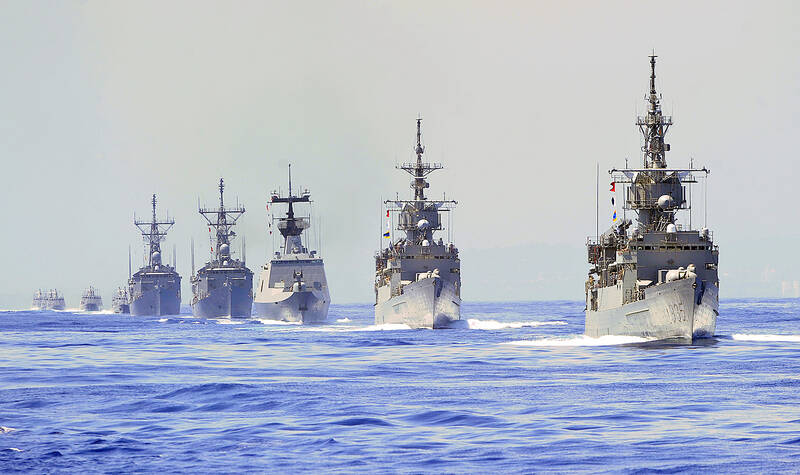Taiwan and the US can use asymmetric weapons to counter a Chinese People’s Liberation Army (PLA) blockade, a defense analyst said yesterday.
Su Tzu-yun (蘇紫雲), a research fellow at the state-run Institute for National Defense and Security Research, made the comments days after Navy Commander Admiral Tang Hua (唐華) said in an interview with The Economist that the PLA is using an “anaconda strategy” to subdue Taiwan.
Taiwan’s armed forces are being stretched thin, and the Chinese military is “slowly, but surely” increasing its presence around Taiwan proper, Tang was quoted as saying, adding that “they are ready to blockade Taiwan at any time they want.”

Photo: Liao Chen-huei, Taipei Times
Tang’s remarks were “factually correct,” but a blockade would also be difficult for Beijing, as achieving victory would require it to win quickly and decisively to avoid the political costs of defeat, Su said.
Citing the US’ Taiwan Relations Act, Su said the US is legally obligated to assist Taiwan if China attempts to alter the “status quo” with non-peaceful means, such as by enacting a naval blockade on shipping.
However, the US has long maintained a stance of “strategic ambiguity” on whether it would intervene in a war to help Taiwan.
Options for the US include taking direct action, such as by challenging the blockade or imposing sanctions, he said.
Anti-blockade operations, a classic form of asymmetric warfare, can include deploying submarines to attack the blockade from a distance, or conducting resupply missions using smaller vessels or airdrops, he said.
Taiwan should increase its stockpile of strategic materials, accelerate the development of alternative transport platforms and make better use of the nation’s fishing harbors for logistics, Su said.
The army and navy must be capable of conducting joint operations to defend shipping lines by deploying coastal anti-ship missile batteries to create a safe zone for resupply and naval combatants to escort convoys, he said.
Ukraine’s use of kamikaze drones to push the Russian Navy away from the nation’s coastal waters is instructive, he added.
However, other researchers say Taiwan still needs more symmetric platforms to be able to break a blockade.
Chieh Chung (揭仲), a researcher at the Association of Strategic Foresight, said Taiwan must obtain more submarines and Aegis Combat System-equipped warships because air and sea control are crucial to anti-blockade operations.
If the nation cannot develop these capabilities in the short term, Taiwan should ask the US for AGM-158C long-range anti-ship missiles, which have a longer range than the Harpoon missiles currently in service, he said.
Stand-off capability is key to creating safe zones for supply ships in the seas surrounding Taiwan, Chieh said.
The government should make arrangements for the US to create safe sea lanes for civilian shipping should China attempt to impose a blockade on the nation, he said.

Taiwan yesterday condemned the recent increase in Chinese coast guard-escorted fishing vessels operating illegally in waters around the Pratas Islands (Dongsha Islands, 東沙群島) in the South China Sea. Unusually large groupings of Chinese fishing vessels began to appear around the islands on Feb. 15, when at least six motherships and 29 smaller boats were sighted, the Coast Guard Administration (CGA) said in a news release. While CGA vessels were dispatched to expel the Chinese boats, Chinese coast guard ships trespassed into Taiwan’s restricted waters and unsuccessfully attempted to interfere, the CGA said. Due to the provocation, the CGA initiated an operation to increase

CHANGING LANDSCAPE: Many of the part-time programs for educators were no longer needed, as many teachers obtain a graduate degree before joining the workforce, experts said Taiwanese universities this year canceled 86 programs, Ministry of Education data showed, with educators attributing the closures to the nation’s low birthrate as well as shifting trends. Fifty-three of the shuttered programs were part-time postgraduate degree programs, about 62 percent of the total, the most in the past five years, the data showed. National Taiwan Normal University (NTNU) discontinued the most part-time master’s programs, at 16: chemistry, life science, earth science, physics, fine arts, music, special education, health promotion and health education, educational psychology and counseling, education, design, Chinese as a second language, library and information sciences, mechatronics engineering, history, physical education

The Chinese military has boosted its capability to fight at a high tempo using the element of surprise and new technology, the Ministry of National Defense said in the Quadrennial Defense Review (QDR) published on Monday last week. The ministry highlighted Chinese People’s Liberation Army (PLA) developments showing significant changes in Beijing’s strategy for war on Taiwan. The PLA has made significant headway in building capabilities for all-weather, multi-domain intelligence, surveillance, operational control and a joint air-sea blockade against Taiwan’s lines of communication, it said. The PLA has also improved its capabilities in direct amphibious assault operations aimed at seizing strategically important beaches,

‘MALIGN PURPOSE’: Governments around the world conduct espionage operations, but China’s is different, as its ultimate goal is annexation, a think tank head said Taiwan is facing a growing existential threat from its own people spying for China, experts said, as the government seeks to toughen measures to stop Beijing’s infiltration efforts and deter Taiwanese turncoats. While Beijing and Taipei have been spying on each other for years, experts said that espionage posed a bigger threat to Taiwan due to the risk of a Chinese attack. Taiwan’s intelligence agency said China used “diverse channels and tactics” to infiltrate the nation’s military, government agencies and pro-China organizations. The main targets were retired and active members of the military, persuaded by money, blackmail or pro-China ideology to steal